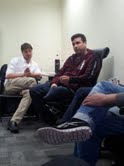Thiel’s Law and Follow the Money
This class focuses on Peter Thiel’s mantra, ‘that a startup messed up at its foundation cannot be fixed.’ To further explore this principle we had the pleasure of being joined by telecoms entrepreneur Haggai Barel. Haggai’s Orca Interactive was acquired by France Telecom that later merged with Viaccess. Haggai established Orca in 1996 and his innovative vision and commitment took it from a small media startup to a global telecoms enterprise.
Haggai provided us with profound insights into how he set up his successful ventures, sighting that a successful marriage amongst the founders was crucial in providing a startup with long-term success.
Founders and founding moments are very important in determining what comes next for a given business. If you focus on the founding and get it right, you have a chance in getting the company from 0 to 1.
Foundings are obviously temporal but how long they last can be hard the question. Its like forming a family, a stable family requires a solid long lasting marriage (founding partnership) and requires children that grow and develop into mature adults (investors). There must be an intrinsic trust and shared vision amongst the investors and their founders.
Founders should stay in charge to take the company from 0 to 1, once the paradigm shifts to n, the founding is over. At that point, executives should execute.
Focusing on the principle of a family, a solid family is built on trust and this is no different from a startup that is committed to growing from A-Z. A family is often chaotic, where people don’t play by the rules. You’ve got the rebellious ill-disciplined teenagers that don’t have any patience for authority (thankfully my kids haven’t reached that stage yet…), however despite this there is an undercurrent of trust where everyone wants the best for one another and is pulling in the same direction. This is mirrored in start ups and some of the great companies of the 21st century such as Google, with high trust people operating within a low alignment structure without a whole lot of constraints.
The low trust, low alignment model is a dog-eat-dog sort of world. People who you might not trust can do a lot of whatever they want. This is the environment of ruthless competition. An environment not suited to breeding creative ideas.
The ideal is the combination of high trust people with a structure that provides a high degree of alignment. An atmosphere where people trust each other and together create a good culture, therefore a good structure.
If founding is like getting married, then taking on investors is like having kids, Things get extra tricky when one has kids, it become much harder to just give up and divorce after you have kids…
Some simple principles for tech startups:
– Make sure there is equity alignment between founders, employees and early investors.
– People must be either fully in the company or not in it at all.
– Vest equity over time depending upon performance and relationship.
– When raising money, never have a down round. It should always be up on the previous one.

